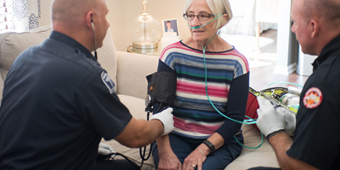- Cardiology And Vascular Health
- Diet and Nutrition
- Health Topics
- Heart And Vascular Disease Prevention
- Heart Health
What’s the Buzz On Caffeine And Heart Health?

Answer a few questions and we'll provide you with a list of primary care providers that best fit your needs.
If you’re like four out of five American adults, you get a daily boost from caffeine in coffee, tea, soft drinks, energy drinks, or chocolate. How does this impact your heart health?
Numerous research studies over the years have explored the link between caffeine and heart health. The results are mixed.
It’s a good idea to talk with your doctor about caffeine and what’s a safe level for you, based on your health.”
Some studies have found that caffeine can raise blood pressure, rev up pulse rates and disrupt normal heart rhythm, increasing risk for heart disease. Others have shown that moderate caffeine consumption does no harm. And some recent findings point to beneficial effects.
The U.S. Food and Drug Administration reports that about 80 percent of adults in the U.S. consume, on average, about 200 milligrams of caffeine a day, the amount in two five-ounce cups of coffee, or four sodas.
Caffeine Effects Vary
“At moderate levels of 300 milligrams a day, caffeine is pretty safe,” says Mark Ringle, MD. “It stimulates neurons in the brain, so it prevents you from going into a sleepy mode.”
However, he cautions, “Caffeine affects each of us differently, depending on our medical history and other factors. It’s a good idea to talk with your doctor about caffeine and what’s a safe level for you, based on your health.”
If you have existing heart disease risk factors, such as high blood pressure, caffeine could have a greater negative impact on your heart than someone with no risk factors.
“Also,” he adds, “if you’re pregnant or breastfeeding, you should be careful about the amount of caffeine you consume.”
Recent Studies Find Caffeine Safe
Recent research that sheds positive light on caffeine include:
- A 12-month study at the University of California, San Francisco, assessed the caffeine intake of 1,400 healthy adults. They wore portable devices that monitored their heart rhythm, 24 hours a day. The study, published in the January 2016 issue of the Journal of the American Heart Association, found that the six out of 10 people in the study who consumed more than one caffeinated product a day did not encounter extra heartbeats, a condition that can lead to heart problems and stroke.
- Research presented in 2013 at the American Heart Association’s Scientific Sessions found that caffeinated coffee might help small blood vessels work better. The study showed that blood flow increased 30 percent in the fingers of test subjects who drank a cup of caffeinated coffee, compared to those who drank decaffeinated coffee.
- Other studies have shown a link between caffeinated coffee drinking and lowered risks of death from heart disease and stroke, and that caffeine may improve the function of larger arteries.
As research continues, the best advice, says Dr. Ringle, is to consult with your physician about the amount of caffeine consumption that’s best for your health.
Answer a few questions and we'll provide you with a list of primary care providers that best fit your needs.
Source: American Heart Association; Everyday Health; Mark Ringle, MD, Beavercreek Family Physicians




